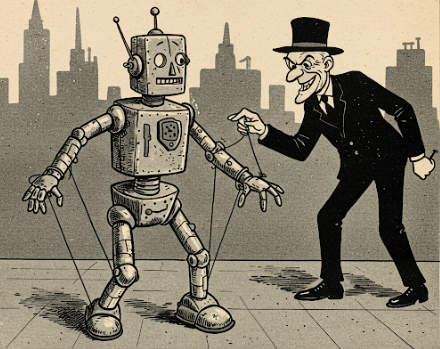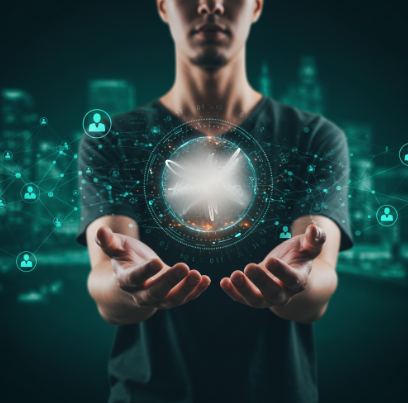· 5 min read
Personal Data Ownership and Portability - A Blockchain Solution?
Reclaiming Our Digital Selves - for it to be genuinely useful, it needs to serve us as individuals... but just how likely is this to be the reality?

Reclaiming Our Digital Selves: The Urgent Need for Personal Data Ownership
In previous posts, I talked about the evolution of AI and how, for it to be genuinely useful, it needs to serve us as individuals. But there’s a bigger issue lurking beneath that conversation—one that impacts not just AI, but every digital interaction we have: who owns our data? And more importantly, who should own it?
We live in a world where personal data is one of the most valuable commodities. Every time we click, swipe, or speak to an AI assistant, our data is being captured and analyzed. From the products we buy to the articles we read, it’s all logged, processed, and turned into valuable insights—usually for someone else’s benefit.
This isn’t a new issue. It’s been building over the past two decades as platforms have grown more sophisticated at gathering, analyzing, and monetizing user data. But as AI becomes more deeply integrated into our lives, it’s time to rethink this dynamic. For AI to truly become personal in the way we’ve discussed, something fundamental has to change: we need to take back ownership of our data.
The Problem with Current Systems
Let’s break this down. Right now, most of our personal data is stored in vast corporate silos—whether it’s our social media activity, search history, purchase data, or even our preferences as interpreted by AI assistants. This data isn’t really ours, even though it’s generated by us. Instead, it’s owned by the companies that gather it, and they have full control over how it’s used.
This results in some pretty significant problems:
- Privacy concerns: We don’t have full control over who has access to our personal information or how it’s used.
- Limited portability: Moving our digital identity across platforms is difficult, if not impossible, without leaving behind a trail of data fragments scattered across various services.
- Profit without consent: Our data is often sold or used to generate revenue through targeted ads, personalized recommendations, or algorithmic predictions—most of which benefit companies, not us.
So, how can we change this? How can we create a system where personal data is actually personal, in the same way I imagined personal digital assistants as agents working for us?
Enter Blockchain and Distributed Systems
This is where blockchain, and more broadly, decentralized systems, come into play.
Blockchain has been making waves for its role in cryptocurrencies, but its underlying technology—the distributed ledger—has much broader applications. At its core, blockchain allows data to be stored in a decentralized manner, meaning no single entity owns or controls it. This creates an opportunity for personal data to be stored, accessed, and transferred in a way that is secure, transparent, and most importantly, controlled by you.
Imagine this: instead of your data being scattered across different platforms, it’s stored in a decentralized system—a kind of digital brain dump that belongs to you alone. When you interact with an AI assistant or any digital service, your data doesn’t live on their servers. Instead, it’s accessed from your personal data wallet, a secure space where you hold the keys. Only you can decide which pieces of data to share and with whom, and when you’re done, you can revoke access.
Data Ownership: The Key to Truly Personal Agents
Here’s where this idea ties back into the previous posts on AI and personal agents.
For AI to be genuinely personal—for it to act as a true agent that serves your unique needs—it needs to be powered by data that reflects you as an individual, not as part of some aggregate. And for that to happen, you need to be in control of your data.
With a blockchain-based personal data system, your AI assistant could access the data you’ve chosen to share, tailoring its actions and recommendations to your specific preferences. What’s more, this assistant would move with you across platforms and services, since your data isn’t locked into any one ecosystem. You could take your personalized AI with you—whether you’re shopping, communicating, or working—and it would always have your best interests in mind, because you own the information it relies on.
This isn’t just about convenience—it’s about fundamentally changing the power dynamic between individuals and the systems they rely on.
The Future of Data Portability: A Vision of Control
Imagine a world where your digital identity—your preferences, your history, your data—is as portable as your physical self. Whether you’re interacting with social media, shopping online, or using an AI to help manage your life, you decide what information is shared and when. Your data isn’t something to be mined for profit—it’s something that works for you.
Blockchain and other distributed systems provide the technological backbone to make this a reality. They allow for decentralized storage, meaning that your data isn’t in the hands of a single company, but rather distributed across a network that you control. It’s the closest thing we have right now to true digital self-sovereignty.
Where to From Here?
We’re at a crossroads. The technology is here, but how we choose to use it will shape the future of personal data ownership, AI, and digital identity. Will we continue down the path where corporations control our data, or will we demand a shift toward decentralized systems that put individuals back in control?
Where to from here? The future of AI and personal data could either lead to deeper corporate entrenchment or to a world where individuals finally have the power to own their digital selves. The choice is ours, but it requires action. We need to explore and embrace technologies that prioritize personal agency and data ownership. The next step forward is not just smarter algorithms, but systems that empower us as individuals, giving us control over our digital lives.


